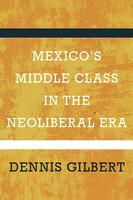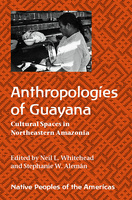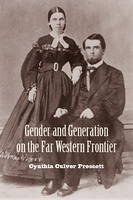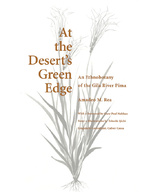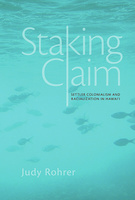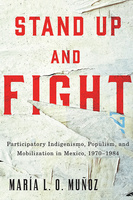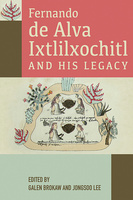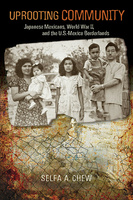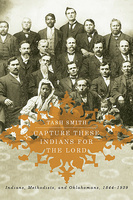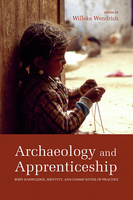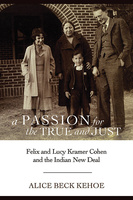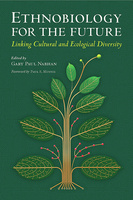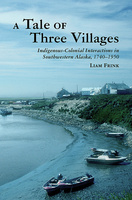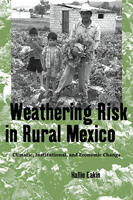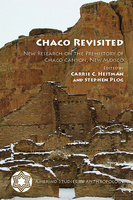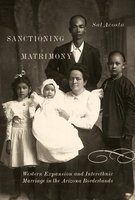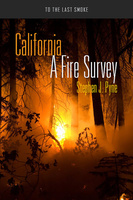The University of Arizona Press is the premier publisher of academic, regional, and literary works in the state of Arizona. They disseminate ideas and knowledge of lasting value that enrich understanding, inspire curiosity, and enlighten readers. They advance the University of Arizona’s mission by connecting scholarship and creative expression to readers worldwide.
Showing 521-540 of 1,708 items.
Anthropologies of Guayana
Cultural Spaces in Northeastern Amazonia
Edited by Neil L. Whitehead and Stephanie Alemán
The University of Arizona Press
This important collection brings together the work of scholars from North America, South America, and Europe to reveal the anthropological significance of Guayana, the ancient realm of El Dorado and still the scene of gold and diamond mining. Beginning with the earliest civilizations of the region, the chapters focus on the historical ecology of the rain forest and the archaeological record up to the sixteenth century, as well as ethnography, ethnology, and perceptions of space. The book features extensive discussions of the history of a range of indigenous groups, such as the Waiwai, Trio, Wajãpi, and Palikur. Contributions analyze the emergence of a postcolonial national society, the contrasts between the coastlands and upland regions, and the significance of race and violence in contemporary politics.
At the Desert's Green Edge
An Ethnobotany of the Gila River Pima
The University of Arizona Press
Winner of the Society for Economic Botany’s Klinger Book Award, this is the first complete ethnobotany of the Gila River Pima, presented from the perspective of the Pimas themselves.
Staking Claim
Settler Colonialism and Racialization in Hawai'i
By Judy Rohrer
The University of Arizona Press
Staking Claim analyzes Hawai‘i at the crossroads of competing claims for identity, belonging, and political status. Judy Rohrer argues that the dual settler colonial processes of racializing native Hawaiians (erasing their indigeneity), and indigenizing non-Hawaiians, enable the staking of non-Hawaiian claims to Hawai‘i.
Stand Up and Fight
Participatory Indigenismo, Populism, and Mobilization in Mexico, 1970–1984
The University of Arizona Press
Stand Up and Fight is the opening analysis of the First National Congress of Indigenous Peoples in Mexico. The author uses never-before-available documents to trace the political history of a group of indigenous leaders and government representatives who defined politics in their own terms during the 1970s and early 1980s.
Fernando de Alva Ixtlilxochitl and His Legacy
Edited by Galen Brokaw and Jongsoo Lee
The University of Arizona Press
Fernando de Alva Ixtlilxochitl and His Legacy provides a much-needed overview of the life, work, and contribution of an important seventeenth-century historian. The volume explores the complexities of Alva Ixtlilxochitl’s life and works, revising and broadening our understanding of his racial and cultural identity and his contribution to Mexican history.
Uprooting Community
Japanese Mexicans, World War II, and the U.S.-Mexico Borderlands
The University of Arizona Press
Uprooting Community examines the political cross-currents that resulted in detention of Japanese Mexicans during World War II. Selfa A. Chew reveals how the entire multiethnic social fabric of the borderlands was reconfigured by the absence of Japanese Mexicans.
Intimate Grammars
An Ethnography of Navajo Poetry
The University of Arizona Press
Through the work of poets such as Luci Tapahonso, Laura Tohe, Rex Lee Jim, Gloria Emerson, Blackhorse Mitchell, Esther Belin, Sherwin Bitsui, and many others, Webster provides new ways of thinking about contemporary Navajo poets and poetry. Intimate Grammars offers an exciting new ethnography of speaking, ethnopoetics, and discourse-centered examinations of language and culture.
Capture These Indians for the Lord
Indians, Methodists, and Oklahomans, 1844-1939
By Tash Smith
The University of Arizona Press
Exploring larger issues associated with western expansion, Capture These Indians for the Lord details the history of the Southern Methodist Church in Oklahoma’s Indian Territory and the complex relationship between its white and Indian membership.
Archaeology and Apprenticeship
Body Knowledge, Identity, and Communities of Practice
Edited by Willeke Wendrich
The University of Arizona Press
Apprenticeship is broadly defined as the transmission of culture through a formal or informal teacher–pupil relationship. This collection invites a wide discussion, citing case studies from all over the world and yet focuses the scholarship into a concise set of contributions. This book also examines apprenticeship in archaeology against a backdrop of sociological and cognitive psychology literature, to enrich the understanding of the relationship between material remains and enculturation.
A Passion for the True and Just
Felix and Lucy Kramer Cohen and the Indian New Deal
The University of Arizona Press
A Passion for the True and Just reveals the moral underpinnings of Felix and Lucy Kramer Cohen and their important contribution to the Indian New Deal. Alice Beck Kehoe illuminates Felix Cohen’s uncompromising commitment to the “true and the just,” rooted in his Jewish intellectual and moral heritage, and Social Democrat principles, that changed American legal philosophy.
Ethnobiology for the Future
Linking Cultural and Ecological Diversity
Edited by Gary Paul Nabhan; Foreword by Paul E. Minnis
The University of Arizona Press
Ethnobiology is dedicated to celebrating the knowledge and values of some of the most distinctive cultures and practices on Earth. In this important new collection, MacArthur Fellow Gary Paul Nabhan lays out the case for the future of the field. Nabhan and his colleagues from across disciplines and cultures call for an ethnobiology that is provocative, problem-driven, and, above all, inspiring.
Asegi Stories
Cherokee Queer and Two-Spirit Memory
The University of Arizona Press
Drawing on oral histories and archival research, this book develops the concept of asegi stories. Asegi translates as “strange,” and it is also used by some Cherokees as a term similar to “Queer.” This book provides a LGBTQ2 lens to interpret the Cherokee past, understand the present, and imagine decolonial futures.
A Tale of Three Villages
Indigenous-Colonial Interactions in Southwestern Alaska, 1740–1950
By Liam Frink
The University of Arizona Press
A Tale of Three Villages tracks the histories of three villages ancestrally linked to Chevak, a contemporary village in southwestern Alaska. Through an innovative interdisciplinary methodology that respectfully and creatively investigates the spatial and material past, the author convincingly demonstrates that, in order to understand colonial history, we must actively incorporate indigenous people as actors, not merely as reactors.
Weathering Risk in Rural Mexico
Climatic, Institutional, and Economic Change
By Hallie Eakin
The University of Arizona Press
Chaco Revisited
New Research on the Prehistory of Chaco Canyon, New Mexico
Edited by Carrie C. Heitman and Stephen Plog
The University of Arizona Press
Bringing together both up-and-coming and well-known scholars of Chaco Canyon, Chaco Revisited provides readers with refreshing and updated analyses of research collected over the course of a century. Addressing age-old questions surrounding the canyon using new methods, contributors prove that Chaco Canyon was even more complex and fascinating than previously understood.
Sanctioning Matrimony
Western Expansion and Interethnic Marriage in the Arizona Borderlands
By Sal Acosta
The University of Arizona Press
Sanctioning Matrimony provides a deep analysis of intermarriage in southern Arizona from 1860 to 1930. Sal Acosta utilizes vital records and census documents to demonstrate how interethnic relationships extended the racial fluidity of the Arizona borderlands.
Florida
A Fire Survey
The University of Arizona Press
In this important new collection of essays on the region, Stephen J. Pyne colorfully explores the ways the region has approached fire management. Florida has long resisted national models of fire suppression in favor of prescribed burning, for which it has ideal environmental conditions and a robust culture. Out of this heritage the fire community has created institutions to match. The Tallahassee region became the ignition point for the national fire revolution of the 1960s. Today, it remains the Silicon Valley of prescription burning. How and why this happened is the topic of a fire reconnaissance that begins in the panhandle and follows Floridian fire south to the Everglades.
California
A Fire Survey
The University of Arizona Press
In this collection of essays on the region, Stephen J. Pyne colorfully explores the ways the region has approached fire management and what sets it apart from other parts of the country. Pyne writes that what makes California’s fire scene unique is how its dramatically distinctive biomes have been yoked to a common system, ultimately committed to suppression, and how its fires burn with a character and on a scale commensurate with the state’s size and political power. California has not only a ferocity of flame but a cultural intensity that few places can match. California’s fires are instantly and hugely broadcast. They shape national institutions, and they have repeatedly defined the discourse of fire’s history. No other place has so sculpted the American way of fire.
Stay Informed
Subscribe nowRecent News


